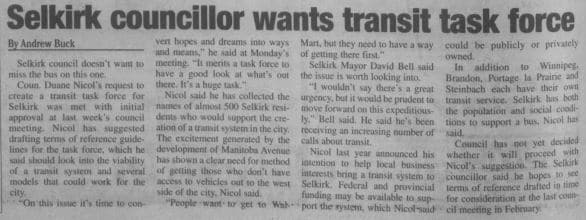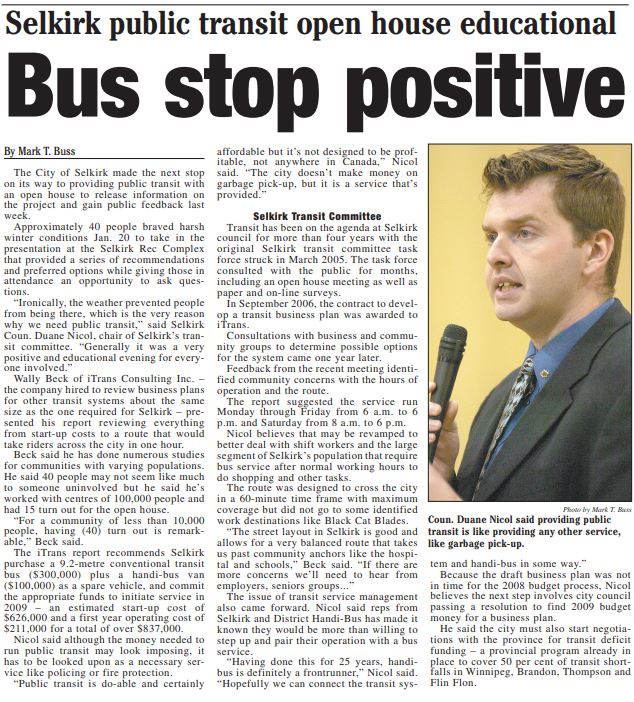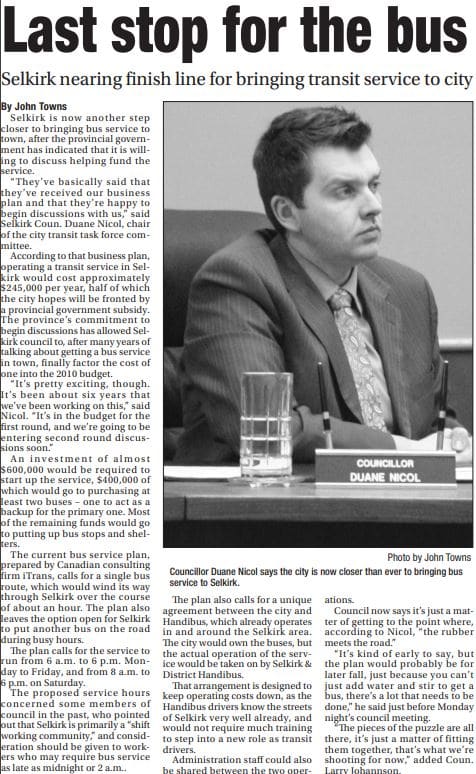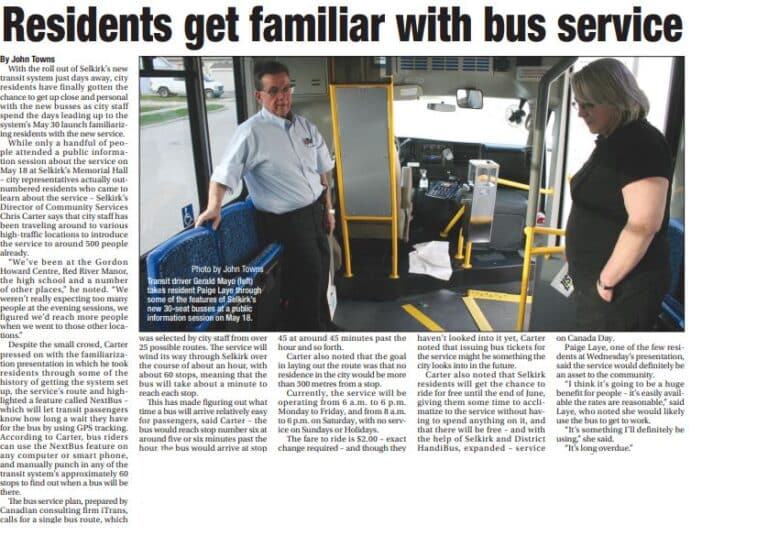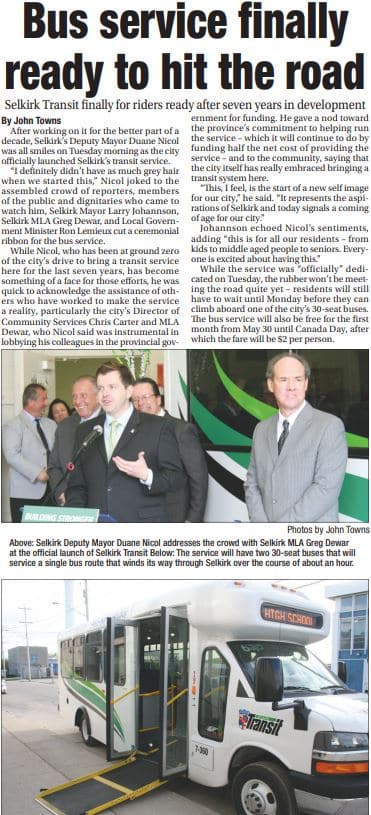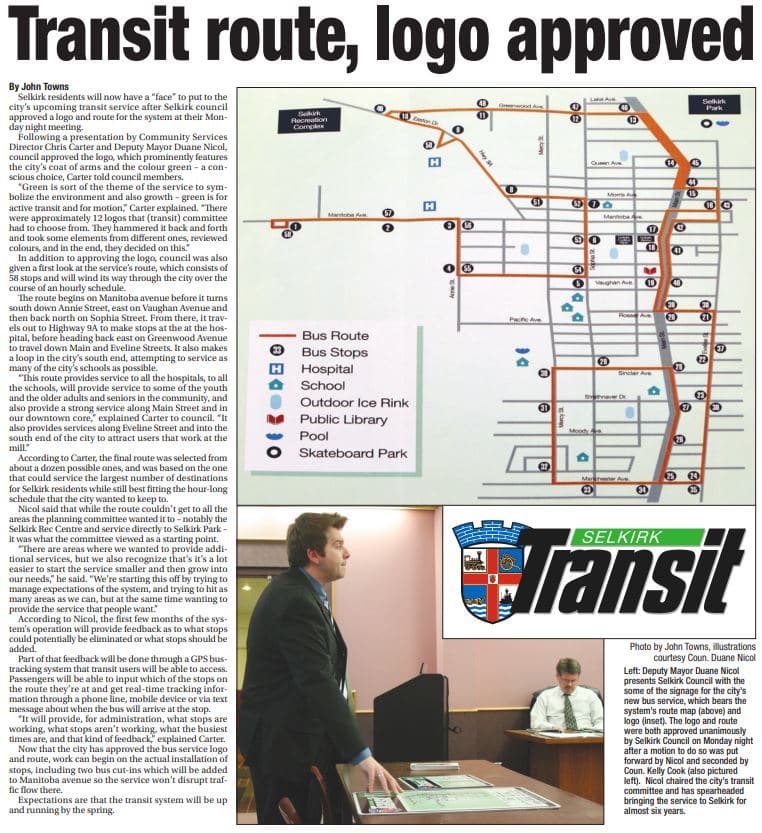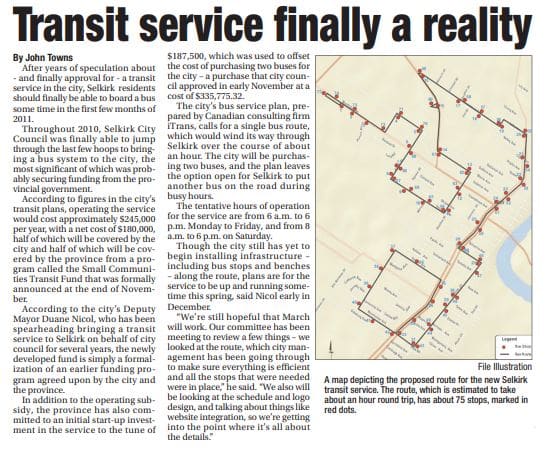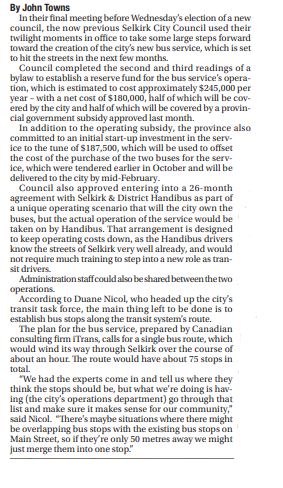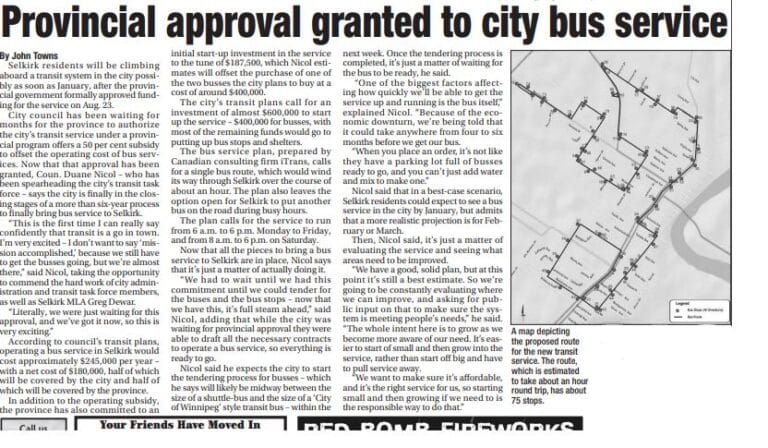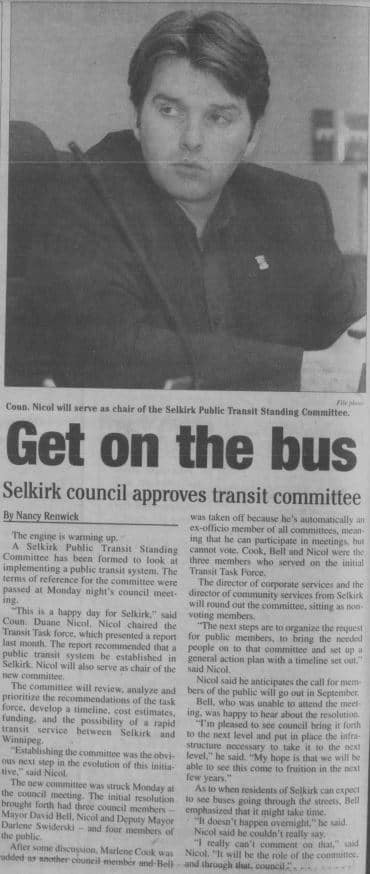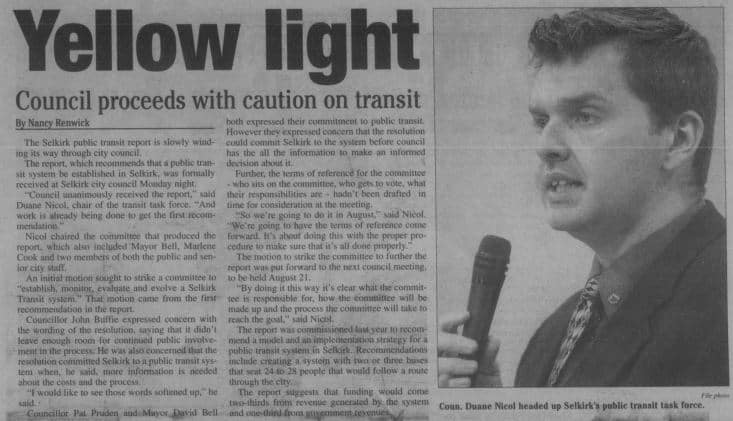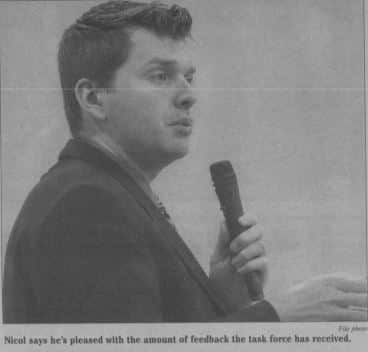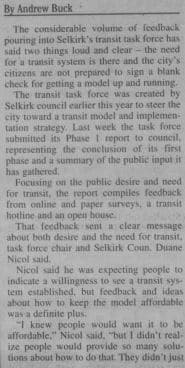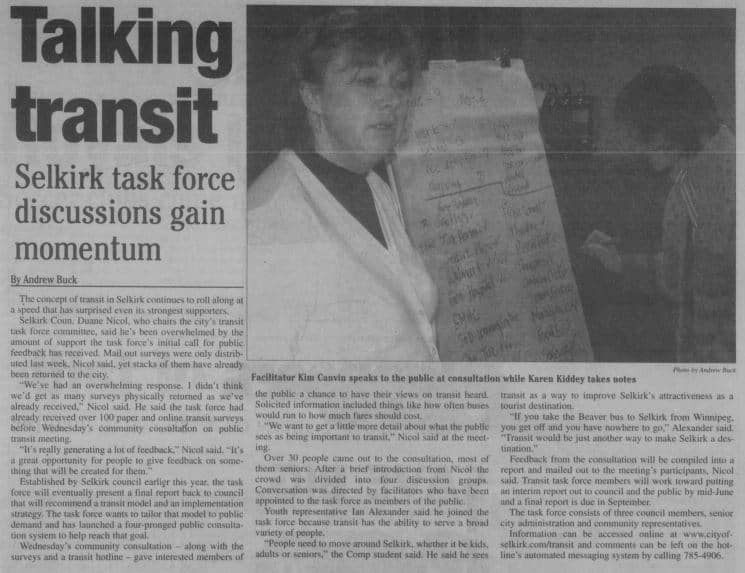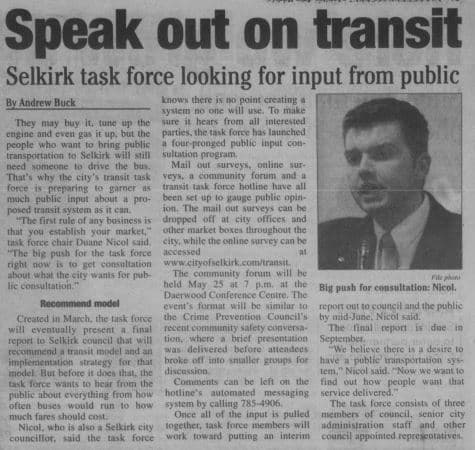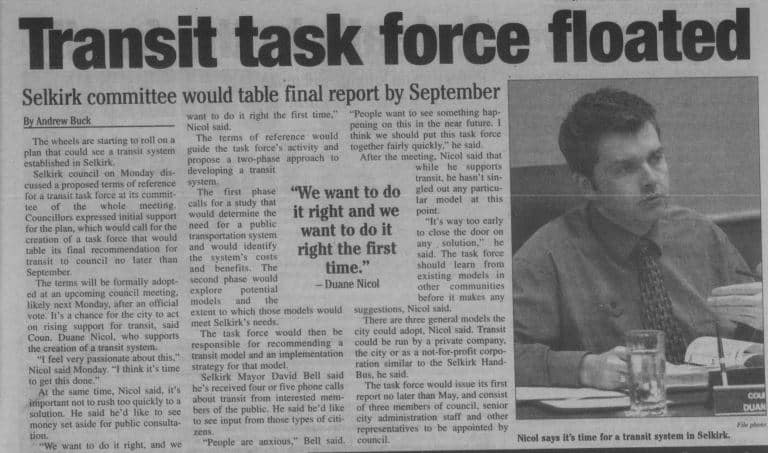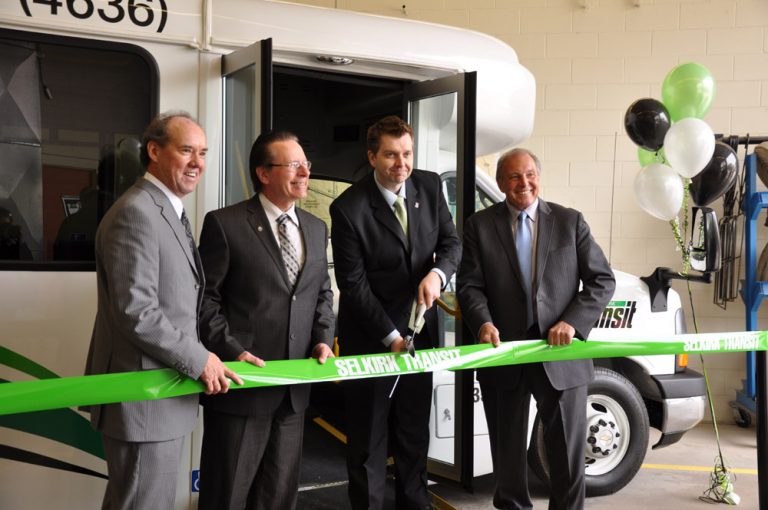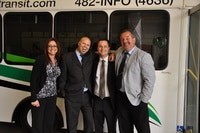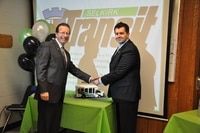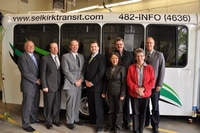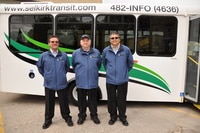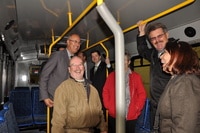Getting the Wheels Rolling
The potential for Selkirk to have affordable and accessible transportation was first articulated as something to consider by mayoral candidate David Bell during the 2002 municipal election all-candidates forum. Bell was elected mayor that year, but no discussion or effort was undertaken by the city to explore the idea following the election.
In 2004, Bill Chartier, the proprietor of Will’s Taxis, approached Councillor Duane Nicol with an idea to establish a bus service for the city delivered by his business. Nicol agreed to work with Chartier to assess the feasibility of such a service and set out collecting information on transit service and financing models.
Knowing that public interest would drive the service, Councillor Duane Nicol also gauged the community by conducting surveys and distributing brochures.
During this time, the west end of Selkirk saw a retail development expansion, including a new Walmart. The location of the new retail outlets on the outskirts of town were too far for people to access on foot. A bus system was clearly needed for the growing City.
Very quickly it was found that public transit services were not money-making ventures and Chartier determined that he could not proceed and his proposed transit system in Selkirk fell through. However, after witnessing the strong interest from citizens, Councillor Nicol decided to explore another delivery model.
The Next Stop
In 2005 Councillor Nicol requested the creation a transit task force. This task force would investigate the level of need for a public transportation system thorough study of the economic, social and physical conditions in the City of Selkirk. In preparation of this Councillor Nicol collected the names of almost 500 Selkirk residents who supported the creation of a transit system.
The task force conducted surveys, community forums, and even set up a transit hotline for comments to garner as much public interest as possible about the proposed public transit plan. The volume of feedback from made the community made two things clear: the need for a public transit system in Selkirk and the desire to keep costs low.
In July 2006, a report of the task forces findings was presented to city council. Council approved the report, and the Selkirk Public Transit Standing Committee was created. The Standing Committee would review and analyze the task force’s recommendations, develop timelines, estimate costs and funding, and pursue the possibility of a rapid transit system between Selkirk and Winnipeg. The councillors who sat on the original committee were Duane Nicol, Darlene Swiderski, and Marlene Cook.
The Standing Committee awarded a contract to develop a business plan to iTRANS Consulting Inc.. iTRANS Consulting is one of the largest Canadian consulting firms, specializing in transportation planning and traffic engineering. The goal was to create a business plan for the city in time for a 2008 budget process and provide Selkirk with a tool to begin negotiations with the province for the support of a transit system.
Consultations with business and community groups began in 2007 to determine possible options for the system. The task force’s report suggested the service run Monday through Friday from 6 a.m. to 6 p.m. and Saturday from 8 a.m. to 6 p.m. The route developed was designed to cross the city in a 60-minute time frame with maximum coverage, taking the bus past community anchors like schools and the hospital.

A Drive for Transit
It wasn’t until 2010 that the wheels of Selkirk Transit started to roll. The provincial government agreed to help fund the service after reading the business plan from the Selkirk Public Transit Standing Committee. The province’s commitment began discussions that finally allowed Selkirk council to factor in the cost of a transit service into the 2010 budget.
The approximate cost of operating a transit service in Selkirk was $245,000 per year, half of which would be fronted by a provincial government subsidy. In addition, an investment of almost $600,000 was required to start up the service, $400,000 of which would go to purchasing at least two busses. Most of the remaining funds would go towards putting up bus stops and shelters.
On August 23, 2010, the provincial government formally approved funding for a transit service in Selkirk. The City was quick to release its tendering processes for the busses only a few weeks later.
The Green Light
After almost seven years of planning, the last item standing in the way of getting Selkirk Transit up and running was the finalization of the route. The 58 chosen stops wound their way through Selkirk on an hourly schedule, meaning that the bus would take about a minute to travel between stops. This system made it easy for residents to figure out what time the bus would arrive. The layout was also designed so that no residents would be more than 300 metres away from a stop. Not only were the stops accessible, but the fare to ride was only $2.00.
Selkirk MLA Greg Dewar, Mayor Larry Johannson, Deputy Mayor Duane Nicol, and Provincial Government Minister Ron Lemieux officially cut the ribbon on the city’s fledgling transit services on May 24, 2011, and Selkirk Transit finally hit the road on May 30, 2011. The first Selkirk residents to use the new service were Arlene and Larry Nicol. They got on the bus at 6:00 am at bus-stop #1.
A Bus You Don't Want to Miss
In 2015 the Selkirk Transit Authority added Selkirk Mobility. Selkirk Mobility provides door to door, assisted transportation service to residents. This improves accessibility and barriers to services and programs. In 2019 Selkirk Mobility added a hybrid bus to its fleet, reducing costs and greenhouse gas emissions.
Since its opening, Selkirk Transit Authority has served over 350,000 people in the community.
This feat has not gone unnoticed as the service has earned numerous awards. In 2013 Transit won the Association of Manitoba Municipalities ‘Municipal Excellence Award’, 2012 they won the Canadian Urban Transit Association ‘Innovation Award’ and in 2018 they won the Selkirk Biz ‘Customer Service Award’. In 2017 Selkirk Mobility was recognized by Selkirk Biz as ‘New Business of the Year’ and won the ‘Customer Service Award.’
Selkirk Transit Collection
Sources
Oral History Interview with Charlene Dunning
Oral History Interview with Duane Nicol
Selkirk Journal, 2005, 2006, 2007, 2010, 2011
Selkirk Transit Photos – City of Selkirk


